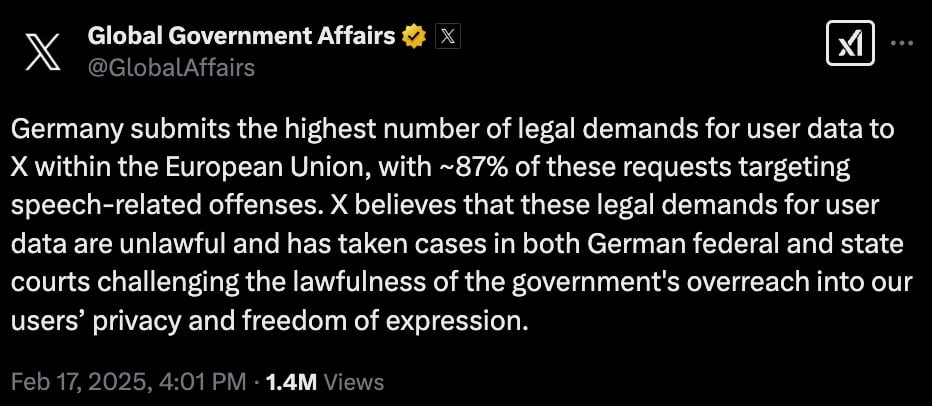Most countries have election campaigns – but Germany seems to be experiencing a “pre-election frenzy” right now. And that election is to take place on Sunday, February 23.
Time is of utmost essence – at least for some of the players involved.
Simultaneously, one of the online platforms that appears to be driving the fear of God into Germany’s ruling class – is X.
And so, a German court has sided with the demand to get X to “share” election data with “researchers.”
But now X – that has all the time in the world in this particular configuration – is fighting back.
The Berlin regional court last week wasted no time issuing an injunction, meant to force X to disclose user data, based on the EU’s censorship law, the Digital Services Act (DSA).
The case was brought on by two NGOs heavily involved (and in many instances funded) by the very same forces behind the DSA, including the EU Commission directly.
No wonder, that the Democracy Reporting International (DRI) and the Society for Civil Rights (GFF) turned to the court to get X to give them the platform’s user data, including that pertaining to likes, shares, and visibility – supposedly, to “track foreign interference.”
The notion that any election that doesn’t go your way – or even just doesn’t seem like it will – is the result of “foreign meddling” gained notorious momentum in the US eight years ago. It has lost steam there, but the narrative still runs on what appear to be some “toxic political fumes” in Europe.
In the midst of this highly charged rhetoric, X is trying to hold its own by bringing up some facts – one of them being that of legal jurisdiction.
Germany and Ireland may be members of the EU – but these nations still have some competency in terms of sovereignty, X hopes.
“X challenges whether the German court is competent to hear the case, given that X’s HQ is in Ireland,” said DRI’s Executive Director Michael Meyer-Resende.

The X Global Government Affairs account painted this bigger picture in a post on February 17:
“Germany submits the highest number of legal demands for user data to X within the European Union, with ~87% of these requests targeting speech-related offenses. X believes that these legal demands for user data are unlawful and has taken cases in both German federal and state courts challenging the lawfulness of the government’s overreach into our users’ privacy and freedom of expression.”










